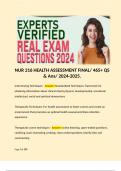NUR 216 HEALTH ASSESSMENT FINAL/ 465+ QS
& Ans/ 2024-2025.
Interviewing Techniques - Answer: Standardized Techniques: fraemwork for
obtaining information about clinical clients physical, developmental, emotional,
intellectual, social and spiritual demensions
Therapeutic Techniques: For health assessment to foster comms and create an
environment that promotes an optimal health assessment/data collection
experience
Therapeutic comm techniques - Answer: Active listening, open-ended questions,
clarifying, back channeling, probing, close ended questions (clarify info) and
summarizing
Page 1 of 133
,Physical Assessment Techniques for older adults - Answer: Allow enough time for
position changes, preform in several shorter assessments, making sure they use
sensory aids and invite them to use the bathroom before beginning the exam
IPPA - Answer: Inspection
Palpation
Percussion
Auscultation
Palpation - Answer: Use of touch to determine size, consistency, temp, texture,
location and tenderness of the skin, tissues and organs.
Dorsal surface is for temp
Palmar surface/base of fingers: vibration
Fingertips: pulsation, position, texture, turgor, size and consistency.
Finger/thumb: grasping an organ or mass
LIGHT THEN DEEP
Percussion - Answer: tapping body parts with fingers or small instruments to
vibrate underlying tissue and evaluate size, location, tenderness and
presence/absence of fluid/air in the body.
Direct: striking body to elicit sounds
Page 2 of 133
,Indirect: placing hand flatly on body as striking surface to produce sound
Fist: helps identify tenderness over the kidneys liver and gallbladder
Auscultation - Answer: Listen for amplitude/intensity, pitch/frequency, duration,
and quality
BELL is for low pitched while DIAPHRAGM is for high pitched
Assessment - Answer: Collecting data, talking, open ended questions and
clustering information
Health History - Answer: Biographical data
Reason for seeking care
present health/present illness
Past history
Med reconciliation
Family History
Review of Systems
Functional assessment (ADL's)
Adult health history - Answer: Biographic data: source of history (who, reliability)
Reason for seeking care
Present health/history of present illness
Page 3 of 133
, Final summary of symptom (location, character/quality, quantity/severity, setting,
aggravating/relieving factors, associated factors and patients’ perception PQRSTU
(provocative/palliative, quality/quantity, region/radiation, severity, timing, and
understanding patient perception)
Past health/present illness (childhood, accidents/injuries, hospitalizations,
operations, births, immunizations, last exam, allergies and current meds)
Family history
Review of the systems (start head to toe unless patient makes clear what is
affecting them and do that body system)
Functional assessments (self esteem concept, activity/exercise, sleep/rest,
nutrition/elimination, interpersonal relationships/resources, spiritual resources
FICA; faith influence community address, coping/stress management, personal
habits, alcohol use CAGE; cut down, annoyed, guilty, eye opening... 2+ yeses
means concern, drugs, environment/hazards, intimate partner violence and
occupational health
General Survey - Answer: Gather from first encounter and continue to make
observations throughout assessment.
Physical appearance (age, gender, race, skin color, LOC, facial features, signs of
distress, signs of abuse/neglect, and signs of substance abuse
Body structure (build, stature, height and weight, nutritional status, symmetry of
body parts, posture and gross abnormalities
Page 4 of 133




